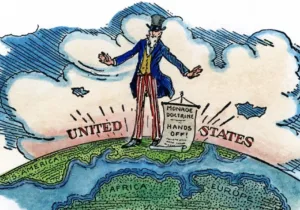How do Martin Luther’s Reformation ideas relate to Latin America today? We might think his views have very little to do with a region that still suffers from medieval social maladies like tyrannical governments, semi-feudal agrarian systems where land ownership is restricted to a few people, and a mystical and fatalist worldview. For Europe, Luther sowed the seed of individual freedom through the theology of personal salvation. But the rise of the Protestant work ethic—structured around the values of the individual, work, and family, seems to have left no impressions on the Christianity practiced in Latin America.
In Latin America, Christianity is as old as the Reformation, and for most of the last 500 years, the region lived soaked in blood and trapped in patterns of injustice similar to those that Luther pointed out to medieval Europe. In its first three centuries there, institutional Christianity in much of Latin America was synonymous with the conquistadors and other exploiters who showed no commitment to believers. One terrible example was the destruction of the massive Jesuit reductions, independent indigenous states within the domains of the Portuguese and Spanish crowns that were crushed violently under the orders of the Catholic leadership. The church betrayed their own to save their political power.
Much later, at the beginning of the twentieth century when the first Pentecostal missionaries arrived in Mexico, Brazil, and other South American countries, the Catholic Church still sided with the political establishment, regardless of its nature. Protestants were then a small group without much social impact. If the adoption of Christianity meant influence toward a society structured around the public value of the individual and the rule of law, then no such movement occurred in Latin America until Pentecostal hymns started being sung in the region. Pentecostalism’s movement from Mexico to Argentina reached a marginalized population which was mostly illiterate. Many times, Pentecostal influences made their entrance through the margins, reaching pueblos, villages, and slums before making an impact in culturally significant cities. Francisco Olazábal (1886–1937), the first major Pentecostal to take Pentecostalism to Mexico, did not work in big cities or places of major influence; he started in the borderlands of northern Mexico, speaking to marginalized populations on both sides of the border. When he reached the country’s southwest region, he focused his ministry on labor camps, factories, and inner-city barrios.
In Brazil, the new faith arrived through two missionaries of Swedish descent influenced by the Azuza revival. Pentecostalism came to a place unlikely to have any influence in the rest of the nation, Belém of Pará—a small city located at the Amazon river estuary. The Swedes were not exceptionally gifted, and one of them fell very sick, and they weren’t able to do much within a few years of their arrival. At the time, Brazil’s main center of power and culture was Rio de Janeiro. Belém was a place at the edge of the nation, which just a few decades before had seen one of the country’s bloodiest wars for independence—the War of Cabanos (1832–35), which killed 30 percent of the state’s population. Considering its violent history and the fact that the city hosted a large colony of lepers at the time, Belém was not the most promising place for someone to start an ambitious movement to change the nation’s social fabric. Nevertheless, a hundred years later, the Assemblies of God of Brazil has over 40 million official members and the ability to significantly influence key social indexes, such as literacy, among the rural population.
What did Pentecostal Christianity carry that had such an impact on its growth and differentiated itself from the Catholicism and some types of Protestantism then-practiced in Latin America? I want to suggest that it brought the idea that faith is based on personal experience, not the tradition of rituals, blind obedience to the clergy, or a proper denomination. It was a faith that was neither ritualistic nor attached to local political or clerical power. It was not an elitist faith based on rationality and proper scholarship, like some versions of Protestantism ostensibly seemed. It was a form of religion as experiential as the animistic rituals Latin Americans were used to, but free from the bondage of fatalism and collectivism.
The term “Pentecostalism” encompasses a diverse range of Christians. Groups like the Assemblies of God are now called by specialists like Allan Anderson “traditional” Pentecostals. He divides the movement into three groups: the traditional, or “historical,” Pentecostals such as the Assemblies of God; the charismatic, or “renewal” ones like the charismatic Baptist, Presbyterians, and charismatic Catholics; and what is called “neo-Pentecostalism.” More than any other group, the neo-Pentecostals typify the mess the Lutheran spirit caused. They base their devotion on personal convictions, interpreting the scriptures directly without the need for illuminated clergy. Consequently, they also differ from each other in almost every theological detail.
In my opinion, Pentecostalism is the movement that most translates the Reformation’s essence in the Global South today. Many decades after its humble beginnings, Pentecostalism has started to gain influence and poses a real threat to the traditional religious landscape. A large news magazine in Brazil published a report in 2018 about the media and elites’ discomfort with Pentecostals and evangelicals’ growing influence. Pentecostals, ignored by the cultural mainstream in most countries, have discovered personal faith, motivation, and value that grants them the notion of citizenship and social participation. But how can this be considered Lutheran? The Holy Spirit communicates to the believer the experience of faith celebrated by Luther.[1]
These are the basic premises of the theology of the reconstruction of the notion of self; this might have triggered a significant social change in the continent:
If the Creator of the universe speaks to me individually through his Spirit, I have value. If I have value, the community to which I belong has value. If my community has value, I have to act responsibly toward it. Because I have value and my community has value, I get a public voice. Because I have value, I can strive for a better future and resist the demons of the inevitable socioeconomic karma that have tormented my ancestors.
In Brazil, for example, Pentecostal believers can be considered the best expression of observable social resistance. The little garage-door church creates its own micro social order, elevating the leaders to the category of “somebody” in the eyes of the neighborhood. This provides its members a sense of belonging and inclusion to the social order. Essential works of national literature, like the book City of God by the ex-slum dweller Paulo Lins, portrays the transformation of ex-criminals through Pentecostal preaching. In Lins’ narrative, one of the first marks of social ascendance is the two-piece suit. The ex-criminal, now a preacher, exchanges the usual hip-hop style clothing for inexpensive two-piece suits. From slum dweller pastors to downtown pastors, Pentecostals use the suit as a type of transformative garment that points to a perceived social inclusiveness in a higher economic class and an embrace of the traditional values of family and work. Pentecostalism in its most varied forms, from the garage church to the cathedral of faith covered in fancy marble and granite, gives the marginal barrios of the big city the pretense of an elite neighborhood. These churches preach a message that is the opposite of what the populist governments tell the population. They hear from the pulpit, “You won your destiny, and if you follow this set of principles (and give us the tithe, of course), you will prosper.”
Consequently, the political landscape has taken a radical turn to the right. In South America, six of the 12 countries have governments that are right or center-right: Brazil, Argentina, Colombia, Peru, Chile, and Paraguay. It is clear that left-wing politicians remained at the opposite side of the wave of this social transformation, demonizing religion as a tool of oppression and repeating the victimization mantra: “You are poor due to circumstances over which you have no control, and you will always be poor unless we help you.” What they do not realize is that the essence of Pentecostal preaching strikes this mantra at the core. The appeal of the Heavenly Father who ascribes to everyone personal value modifies one’s perception of agency. The Pentecostal believer must choose between seeing himself or herself as a victim or accepting the love of the Heavenly Father who promises to reward personal effort. Brazil’s last election is a classic example of how surprised and out of tune the intellectual elites were with the desire of the people. To the media and elites’ total horror, the election of the unsophisticated congressman Jair Bolsonaro can be credited in great part to the political activism of neo-Pentecostals.
We might conclude that the apparently
non-theological and highly experiential Pentecostalism in Latin America might
be better equipped than previous Protestant denominations to replicate Luther’s
Reformation in the continent. However, it is still too early to say whether the
correlation of Pentecostal faith with positive social and economic outlooks will
last or be a passing wave.
[1] Sarah H. Wilson also refers to the “experience of faith” as theprimaryn link from Luther to Pentecostalism. See A Guide to Pentecostal Movements for Lutherans (Eugene, OR: Wipf and Stock Publishers, 2016).






